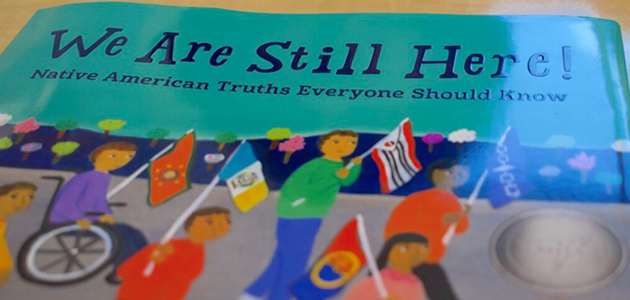The program is required under a Washington law passed eight years ago but still hasn’t been fully adopted. A pending bill would tighten standards and provide additional support.
||| FROM WASHINGTON STATE STANDARD |||
When Lopez entered her senior year, she had no idea what she wanted to do next. So she spent a lot of time thinking about what she cared about, and what came to mind was her Native history class. Now 19, Lopez plans to become a Native studies teacher.
“From that point forward, that was my purpose for my future,” Lopez said.
Since Time Immemorial is important to students like Lopez — but non-Native students, too, should be learning about the communities they live among, said Willard Bill Jr., assistant director of the state’s Office of Native Education within the Office of the Superintendent of Public Instruction.
“It’s primarily to educate the broader…public school kid, so that when they graduate, they have a better understanding of what sovereignty is, what a reservation is, what does that mean, all the intricacies,” Bill said.
Although the Legislature mandated the curriculum in 2015, no deadline has been set for implementation. And while some districts are partnering with tribes to implement the curriculum, other tribal leaders told state officials they’ve struggled to get their school boards to comply.
Legislation sponsored by state Rep. Debra Lekanoff, House Bill 1332, would set minimum standards, a deadline for implementation of Since Time Immemorial and clear the way for state grants to help develop curricula. It failed to pass in this year’s legislative session. State officials say they’re optimistic about its chances in the upcoming session, which begins Jan. 8.
Efforts to implement
According to a 2022-2023 school year report from the State Board of Education, around 80% to 90% of school districts are incorporating tribal history and culture in their social studies programs. That’s a big jump from the last report from the 2021-2022 school year when 44% of districts reported having yet to implement tribal history and culture into their social studies curricula.
But without minimum standards, Henry Strom, executive director of the state’s Office of Native Education, said it’s difficult to know how many schools are providing quality Since Time Immemorial curricula because the original 2015 legislation did not set minimum standards. That’s why HB 1332 is important, he said.
At a meeting last month between tribal and state governments, Gov. Jay Inslee asked Suquamish Tribe chair Leonard Forsman how many districts were “cutting the mustard” when it came to implementing Since Time Immemorial.
“I think we’re probably under a third,” said Forsman, also a University of Washington board of regents member. He said the actual statistic may be lower.
“So that’s not exactly a success,” Inslee responded.
In the 2022 report, some officials in districts that had not yet implemented Since Time Immemorial reported that their districts had not updated their overall social studies curriculums.
“A district could, in theory, choose to delay the onset of a social studies [curriculum] adoption if they weren’t inclined to support Since Time Immemorial,” Strom said at the meeting where Forsman and Inslee spoke.
The work to create and implement Since Time Immemorial began in 1989, said Bill, whose father was one of the first tribal leaders to work on the curriculum. Tribes started funding the work in 2003, and the first legislation “strongly encouraging” implementing the curriculum came in 2005.
“This is some legacy work for us that we’re carrying on,” said Bill, a member of the Muckleshoot Tribe.
**If you are reading theOrcasonian for free, thank your fellow islanders. If you would like to support theOrcasonian CLICK HERE to set your modestly-priced, voluntary subscription. Otherwise, no worries; we’re happy to share with you.**








